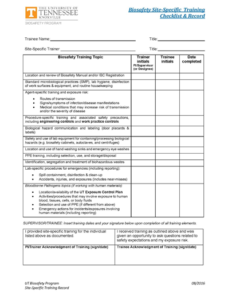 Based on federal and institutional guidelines, faculty, staff and students are required to complete both initial and refresher biosafety training if their research involves the following:
Based on federal and institutional guidelines, faculty, staff and students are required to complete both initial and refresher biosafety training if their research involves the following:
- Agents infectious to humans
- Animal/plant pathogens requiring enhanced containment per federal permit provisions
- Recombinant or synthetic nucleic acids
- Acute biological toxins
- Human or nonhuman primate-derived materials
- Animal specimens or environmental samples that likely harbor infectious agents affecting humans (per risk assessment)
In addition to classroom or online training, lab-specific training is required. This training is directed by the PI or senior laboratory personnel and must be completed prior to beginning work in the lab. The lab-specific training form provided at the conclusion of this training must be completed and filed in the lab for review during biosafety audits.
Other Biosafety Training
Other specialized training modules are provided depending on the type of work being carried out. Examples of specialized training are below:
- Bloodborne Pathogens (BBP) training: Required if manipulating unfixed and untested human tissues and cells in a research setting or if handling wastes contaminated with these materials (note: BBP is included in this initial training, but can be offered separately depending on the activity/department).
- Exempt biological materials, category B biological substance, and dry ice shipping: Required if packaging and shipping microbiological cultures, diagnostic specimens, or biological materials (with or without dry ice) by air or ground.
- Shipping of regulated medical waste: Required if packing and shipping regulated medical waste by ground (U.S. DOT provision) and/or if signing shipping papers for regulated medical waste.
- Animal biosafety: Required if providing animal care or support for studies involving agents infectious to humans, human-derived materials (including human xenografts), or acute biological toxins.
- Animal Hazard Control Form review: Required if performing procedures involving microbiological agents, human-derived materials, or acute biological toxins in an animal model that requires BSL-2 containment facilities.
- IBC committee (IBC) and regulatory compliance training: Required if serving as a member of the IBC and for those initiating or supervising research projects involving recombinant or synthetic nucleic acids (covered in this training), select agents, or other biological materials covered by the IBC or various U.S. federal, state, or local authorities (e.g., USDA APHIS permit review/training).
- Agent specific training: Required if manipulating infectious agents, acute biological toxins, or other biological hazards covered by the Biosafety Program. This training may be provided by the PI (or designate) or in conjunction with the Biosafety Office (note: this a required item on the site-specific training checklist).